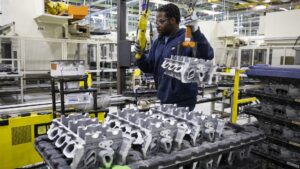The Automotive Industry’s Unprecedented Alliance Against Tariffs: What You Need to Know
At Extreme Investor Network, we strive to keep our readers informed about critical shifts in the business landscape, especially within industries that significantly influence the global economy. Today, we focus on a developing situation in the U.S. automotive sector, where six prominent policy groups are joining forces to combat proposed tariffs that could drastically alter the industry’s future.
A Unified Front
In an unusual move for an industry typically characterized by competition, six major automotive policy groups—including the Alliance for Automotive Innovation and the National Automobile Dealers Association—have banded together to formally oppose a proposed 25% tariff on auto parts slated to take effect on May 3. This coalition is remarkable not just for its size but also for the diversity of its membership, which encompasses franchised dealers, suppliers, and nearly all major automakers.
The letter sent to key administration officials underscores the urgency of the situation. Many auto suppliers are already facing financial distress, and the additional burden of new tariffs could push them past the brink, leading to severe repercussions for automotive production in the U.S.
Economic Impacts
The combined industries represented by this coalition contribute more than $1.2 trillion to the U.S. economy and support approximately 10 million jobs across all states. The letter stresses, “It only takes the failure of one supplier to lead to a shutdown of an automaker’s production line.” Such a domino effect can ripple through the entire supply chain, as seen during the pandemic when shortages and operational stoppages left many workers without jobs.
The automotive industry is not just a significant contributor to the economy; it is a cornerstone of American manufacturing. Tariffs of this magnitude could potentially lead to millions of lost vehicle sales, inflated prices for new and used cars, and a projected $100 billion in increased costs across the sector, according to various Wall Street sources and automotive analysts.
Tariffs and Supply Chains: A Complex Relationship
While the industry is largely united in its opposition to the tariffs, it’s essential to recognize that not all automakers are represented in this coalition. Companies like Tesla, Rivian, and Lucid Group operate under different business models that may insulate them from some of the immediate impacts of these tariffs. However, the broader supply chain is intricate and interconnected, meaning disruptions affect all players—established or emerging.
The coalition’s letter emphasized the necessity of a structured transition period for automakers, particularly as they rethink their manufacturing strategies to focus on domestic production rather than relying on imports from Canada, Mexico, and other nations. President Trump has hinted at a willingness to reconsider these tariffs—a potential olive branch for manufacturers navigating these tumultuous waters.
The Road Ahead
This joint appeal marks a significant moment in automotive history. It reflects a recognition among industry leaders that the stakes have never been higher. As manufacturers adapt to electrification and sustainability goals, they must also contend with changing trade policies that could hinder their progress.
At Extreme Investor Network, we believe that staying ahead in such a dynamic market requires not just awareness, but proactive planning and advocacy. Understanding these shifts could give investors, manufacturers, and consumers a competitive edge in a rapidly evolving landscape. As we monitor this situation closely, we encourage our readers to contemplate the long-term implications of these tariffs on both local production and global supply chains.
In conclusion, the automotive industry finds itself at a crucial crossroads. Will the unified voice of these organizations influence policy, or will the tariffs take a toll on a sector crucial to the American economy? Only time will tell, but one thing is clear: cooperation may be the industry’s most valuable asset in overcoming challenges ahead. Stay tuned to Extreme Investor Network for in-depth analysis and updates on this continuously evolving narrative.

